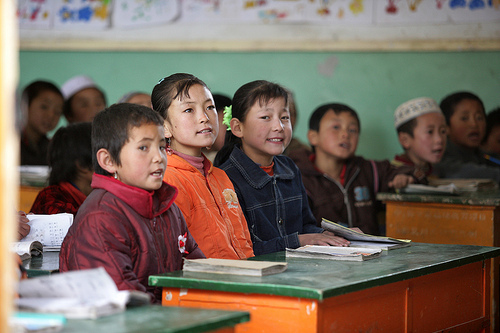 According to a report released by Human Rights Watch on July 15, 2013, Chinese children with disabilities are suffering from severe discrimination in access to education.
According to a report released by Human Rights Watch on July 15, 2013, Chinese children with disabilities are suffering from severe discrimination in access to education.
At least 83 million people with disabilities reside in China, over 40 percent of whom are illiterate. Though the enrollment of children in primary school is reported to be nationally widespread, this only applies to children who have the “ability to adapt” to schools’ learning environment, as coined by the Chines government.
A recent report released by China’s Education Ministry says that about 28 percent of children with disabilities are not receiving the basic education to which they are legally entitled. On the brighter side, the enrollment rate of 72 percent, a 10 percent leap from 2008, reflects a growing number of disabled students in regular schools with accommodations. Currently, more than half of 387,800 disabled students are enrolled at regular schools and those located in three major eastern cities are reported to be banned from turning down disabled students. The report also says that both central and local governments have increased funding for special education.
In 2008, the Chinese government ratified the Convention on the Rights of Persons with Disabilities (CRPD), an international treaty drafted by the UN. As stated by this treaty, the Chinese government must provide an inclusive educational system in which disabled children’s right to equal education can be properly upheld. This obligation extends to providing not just “reasonable” but adequate accommodations for the aid of disabled students. The same year, a law which “pledged greater funding for the education of people with disabilities” was also passed. Additionally, the Chinese government has attempted to increase the enrollment rate of disabled students by implementing rules and regulations such as waved school fees.
However, in reality, children with disabilities are denied access to mainstream schools which pressure them to leave or fail to assist their needs.
The Human Rights Watch report makes clear that a large number of teachers in regular schools are not adequately equipped with teaching children with disabilities, with “very little support, very few resources [and] very little training”.
Special education schools are available but these schools segregate students from the general population. Often times, students are required to be separated from their families starting at a young age. Once they reach the age of junior middle school, the window of opportunity shrinks even smaller.
Even if the students get through secondary education, the gateway to higher education poses even more hurdles to overcome. Students have to take physical examinations that will heavily dictate their admissions process. According to the government policy, universities can reject students with disabilities based on their test results.
Sophie Richardson, China director at Human Rights Watch, stated, “Inclusive education isn’t just a legal obligation. It’s also critical to combating stereotyping and discrimination, and to building a tolerant and inclusive society.”
The report also urged the Chinese government to develop a consistent and clear plan for the education of disabled students.
Creative Commons Love: World Bank Photo Collection on Flickr.com
















